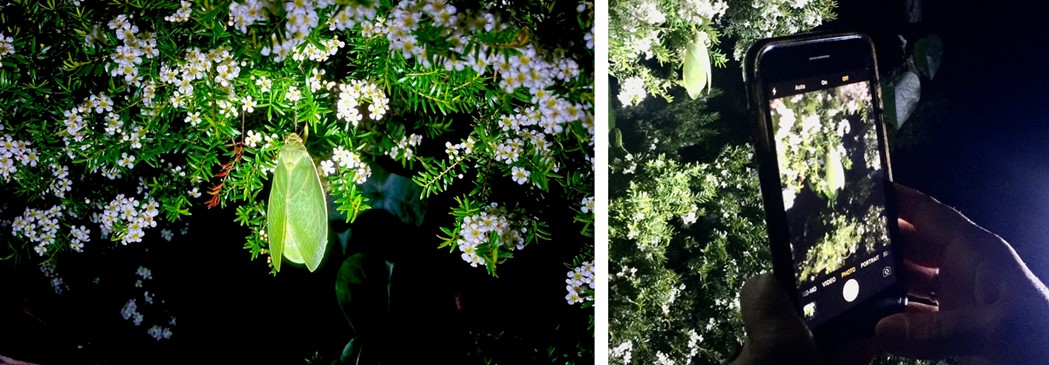In this issue
Featured
Frogging at Narara Ecovillage
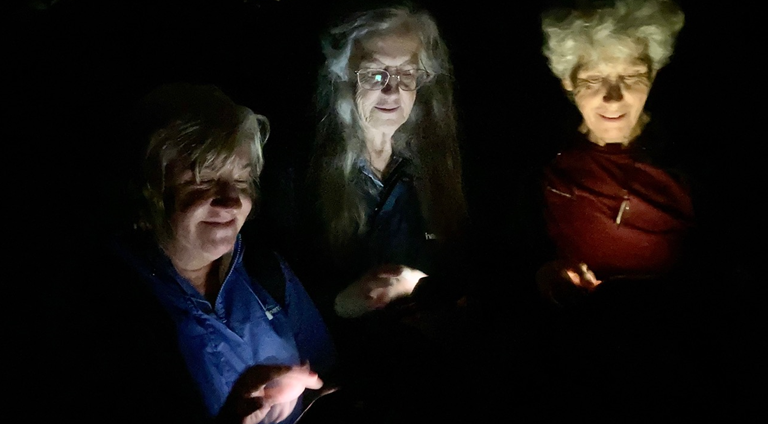
Above: Citizen scientists having a froggy good time
-Words and photos: Richard Cassels, Lorraine Hawdon, Guy Dutson
On a humid Saturday night (November 19 2021), five frog enthusiasts from the ecovillage set out to record the local frogs, using the wonderful free FrogID app, created by the Australian Museum.
This year, frog records are particularly important as the winter has seen mass die-off of frogs in some areas of the east coast of Australia. The causes are not yet known (more information, including how you can help).
The Frog ID app works by letting you make recordings of frog calls, which are automatically sent to the Australian Museum in Sydney. A week or so later, you receive an email telling you what frogs were there.
Recording sounds is so much less intrusive than trying to find the frogs, and also helps prevent froggers from accidentally spreading the deadly chytrid fungus on their shoes.
The good news from Friday night is that most of our local frogs still seem to be doing OK. However, we will have to wait for the museum to send us all the identifications before we are sure of this.
Our recording coordinator Lorraine said, “We did have a croaking good time! ???? ???? We don’t think there was as much diversity as last year and fewer frogs, probably due to dry weather. For example, the Billabong in the forest was silent, with little water. We also saw some fireflies and a Bladder Cicada, which was pretty special”.

ABOVE: Litoria phyllochroa, Green Tree Frog & Limnodynastes peroniiStriped Marsh Frog. Both found at Narara Ecovillage
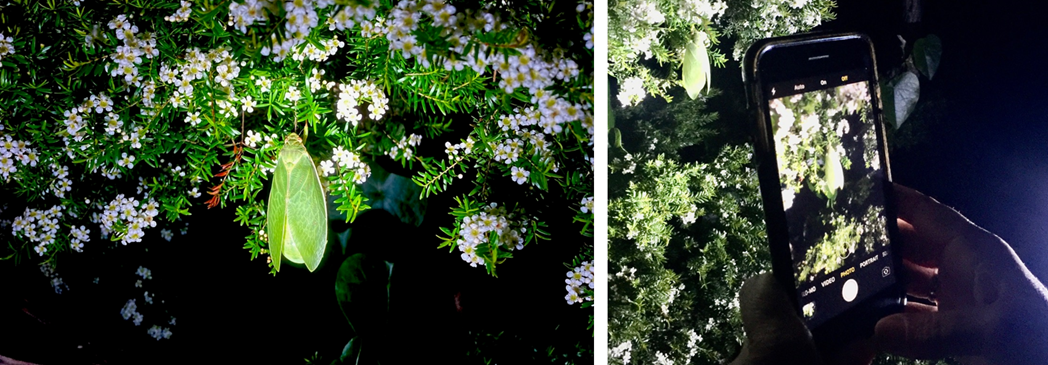
ABOVE- Capturing the Bladder Cicada (Cystosoma saundersii), which has a distinctive deep and loud call that starts at dusk. Narara is near the southern limit of its distribution.
Thanks to all for participating in this important work for our community and for the health of our frogs.
________________________________________
Over 100 people shape new Aim for Narara Ecovillage: Building agreement

-Lyndall Parris
Sociocracy has a graceful methodology to guide complex and important group decisions, such as developing a new Aim for Narara Ecovillage that everyone can live with.
Our previous Aim to research, design and build an ecovillage is all but achieved, and we were beginning to ask: what next for Nararians?
In June this year, we started with picture forming: consulting the broadest range of views to get all ideas and perspectives ‘on the table.’ About 100 adults contributed over several sessions – the first one face-to-face for the Next Geners (under 50 or with children at home), followed by two online sessions (during lockdown) with all age groups invited to participate, and a final session for the ecovillage children.
Up to 8 ‘tuners’ from different age demographics then collated and grouped the material, pulling out significant and repeated words and phrases, and synthesising the contributions in various formats.
From this, an initial draft Aim was agreed by the tuners and then emailed to all members for comments and feedback. This gave us fantastic feedback, leading to necessary redrafts.
We then held 2 further rounds by email: each involved circulating the latest draft Aim to all members.
Finally, we presented the final draft at the November Member’s Meeting for successful ratification. This new Aim, which will guide our future operations, has some explanatory notes, which can be found on the ecovillage website here.
Ladies and gentlemen, boys and girls, here is the Narara Ecovillage Aim for the next phase of this amazing collaborative project:
Our Aim is to nurture a resilient and inclusive intergenerational community that inspires collaboration, innovation and fun; to live with kindness, aware of our interdependence with others and the natural world; and to learn and demonstrate ways to thrive within the earth’s ecological capacity, drawing on Indigenous wisdom and fostering regenerative environmental, social and economic practices.
________________________________________
Selling Community, and we’ll throw in a block of land!
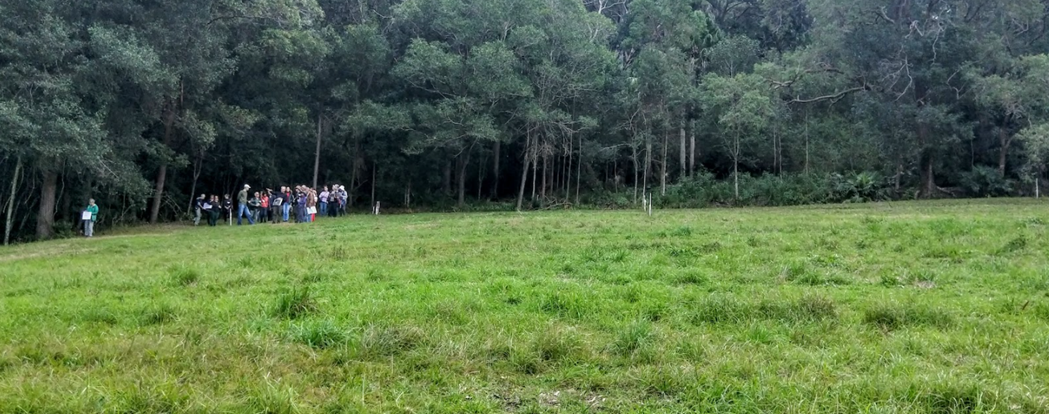
-Lyndall Parris
At Narara Ecovillage this has been our adage through our extraordinary lot sales process, which makes ours very different to a conventional development process.
We are offering life in an ‘intentional community’ for bold people, up for exploring neighbourly connection in all its phases.
Stage 1 (60 lots) is fully subscribed, with around 45 homes occupied and the rest at varying stages of progress.
The 40 lots in Stage 2 are substantially sold. However, there are a few lots still available, and we know that there are potentially some properties where the owners may be looking to share their lot. Another exciting initiative is the development of a BIG house, in which multiple households can explore smaller footprint, more affordable co-living.
Don’t hesitate to contact us if you are interested in living at Narara Ecovillage: info@nararaecovillage.com
Gold equals sold lots
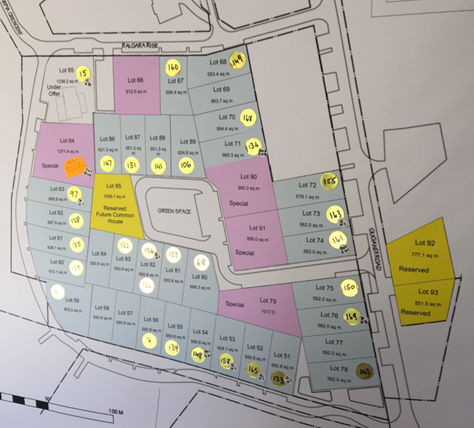
Photos from less locked down times
Working bee: bushfire prep
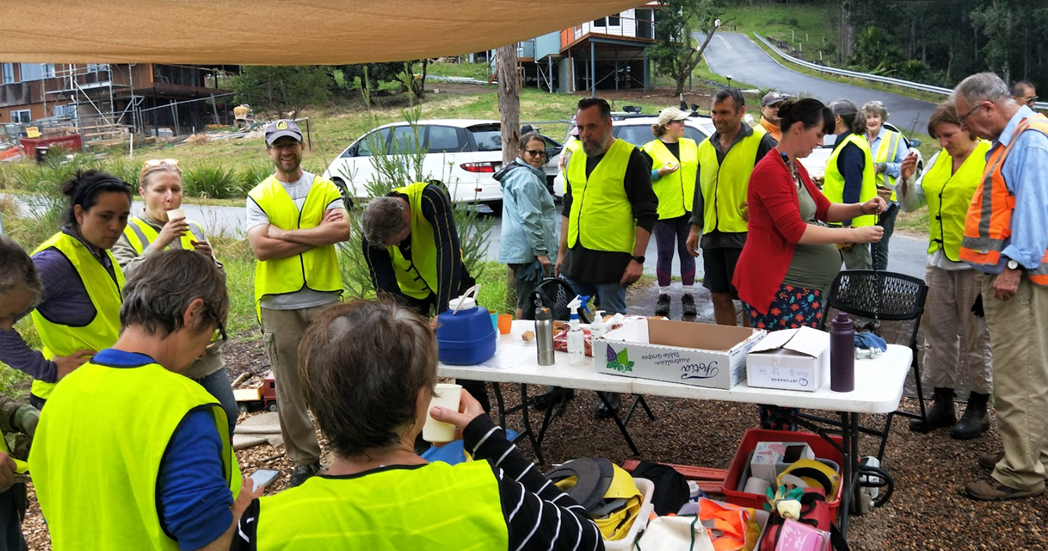
Chinese New Year celebration
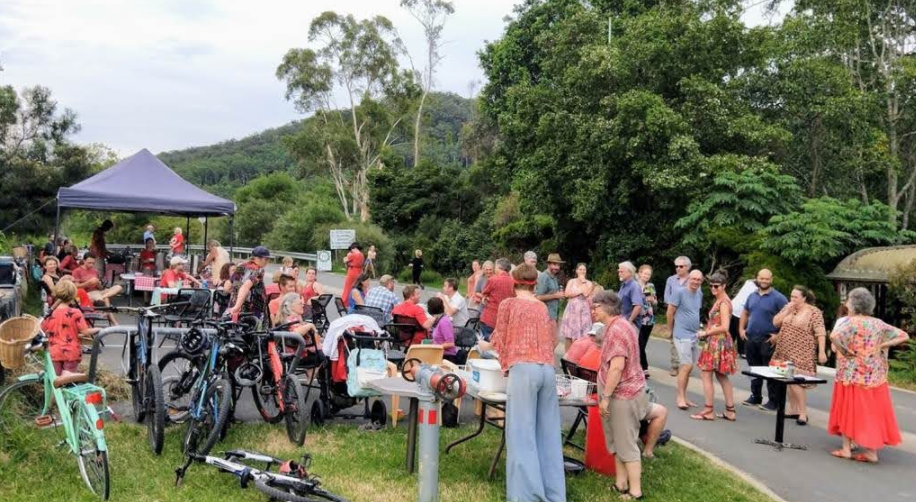
What’s on
Narara Ecovillage monthly Open Day: ONLINE Sun Nov 28, 10.30am-12pm
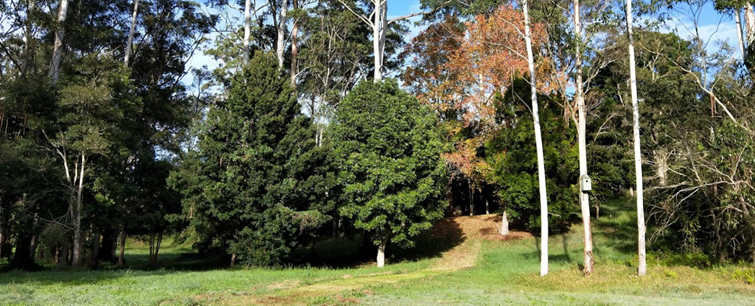
Brew up a Sunday morning coffee or tea and quiz our Ecovillage members on the topics you’ve always wanted to ask about but didn’t know how.
• When: 10.30am-12pm
• Price: Free or by donation
• What: Start with a general introductory presentation to the village, then ask your questions.
________________________________________
Build Your Own Micro Economy ONLINE Workshop Thu Nov 25 7-9 pm AEDT (UTC 8-10 am)
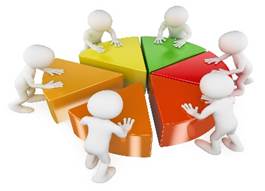
-with Graham Boyd and Narara Ecovillage
The concept of the FairShares Commons Company is a ground-breaking model for the new economy.
Developed by Graham Boyd and Jack Reardon, the FairShares model gives us a way to ensure that for-profit companies’ activities are geared to the benefit of the whole community.
Narara Ecovillage is trialling the Fair Shares model in its educational outreach program. This enables the many stakeholders to receive reward from the activities.
This workshop will explore:
• Why our economy is failing us, and why economics is today not capable of guiding us towards an economy that we need.
• Why we need to create free commons companies and an economy of the free if we are to address our global challenges, and the underlying foundation of such companies.
• Why every decision you take is completely rational, and what this means for:
- understanding yourself and others
- building businesses that work
- economic models
• Why this gives us reasons for hope, and what you can do next to build on these foundations. • MORE about FairShares
________________________________________
-Rafaele Joudry
The workshop will cover the foundations of the book Rebuild, presenting cutting edge approaches to addressing the challenges of today and tomorrow. It is for anyone wanting to build a better world.
The idea of a FairShares Commons Company emerged from the work of Graham Boyd and Jack Reardon, and the consultancy company Evolutesix. An Analogy
We cannot build the new economic paradigm we need if we use our current building blocks. Gustave Eiffel created an entirely new paradigm for tall buildings. His tower was double the height (324m) of the then tallest tower, the Ulm Minster (162m).
By creating a completely new building paradigm, based on a brand-new building block – steel, he demonstrated how to do what was absolutely impossible in the stone paradigm.
We cannot build the new economic paradigm we need if we use our current building blocks, just as a 324m stone tower would have collapsed into rubble.
The Backdrop
The company is one building block of our economy; and the limited company dominates. The other building blocks are you, me, and nature; wearing multiple hats as staff, investors, suppliers, etc. of the different capitals we bring.
These building blocks are the dots in a join the dots image. And like a join the dots image, the dots are secondary; the connections between them are primary. Connections, relationships, the lines between the dots are the economy. Stakeholder Capitalism succeeds or fails to the extent that the building block, the company, puts all relevant kinds of connections onto an equitable footing in the incorporation.
Currencies turn the connections from static to dynamic, forming an economy of value flows of all capitals, thereby providing for needs. Today one currency type, positive interest bank debt, a.k.a. money, overwhelmingly dominates.
There have been many attempts to create alternatives to the limited company—e.g., traditional cooperatives and employee-owned companies. They are better, but they’re incremental improvements, within the same paradigm, too weak to be the game changer we need because they still exclude key stakeholders and relationships from governance inside the company.
Our current economy, built on these company forms and money, gives rise to major enemies for the long term sustainability of humanity, because its very foundation is inequality, which creates corruption, polarisation, war and worse. The world is starting to appreciate the power of a more appropriate, robust, free-standing stakeholder economy. But by any measure we can easily prove it will be too fragile for us to have a long-term future if we use the current building blocks.
The Critical Insight
There is a nearly invisible, significant and systemic reason why all attempts to transform business and our economy in the past five decades have failed. Whether it’s (for example) triple bottom line, circular/regenerative economy, or fair trade, they’ve all fallen far short.
They’re incapable of delivering the reliable long-term social and environmental turn-around humanity needs because all the governance power is concentrated in one type of stakeholder, within a framework of financial capital and its currency, money.
Such building blocks cannot support the fundamentals that circular and regenerative economies depend on, especially the systemic trust needed to create mutual interdependence between multiple companies, capitals, and stakeholders.
Experienced start-up founder and corporate innovation manager, Graham Boyd has extensive experience with the complexity of leading business and is driven to make a difference through innovation that enables businesses and people to do more with less friction.
Stemming from the realisation that the climate crisis on its own will not catalyse the transformative action at a fundamental level needed to make business an ‘intrinsic force for good’, the mission of evolutesix is to help people build WHOLE, connected economic models (not disconnected business models); ecosystems of inherently regenerative startups, teams, and people; all making tomorrow’s world whole by solving our biggest challenges.
• Learn how the Fair Shares model is being trialled by Narara Ecovillage in their collectively owned education business.
• Discover how to use the Fair Shares mix deck that includes all stakeholders and how you could apply this model in your own organisations.
________________________________________
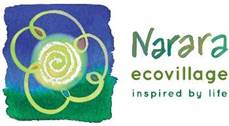

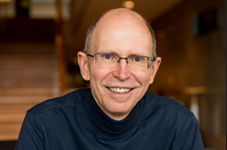
“A Taste of Sociocracy”
ONLINE Friday Nov 26 7:30-9pm
How do you get your family, business team or, in our case, ~190 adults to make decisions, resolve conflicts and feel that they have been heard? Narara Ecovillage is using Sociocracy.
This is a decision-making and governance system that:
• Is inclusive, transparent and equitable, including all voices
• Promotes a better use of resources, and coordination of activities
• Leads to care, respect and cooperation
• Ensures results of decisions are reviewed to determine their ongoing usefulness This system has relevance for communities, businesses, non-profits, families and more.
Come and have a ‘taste’ of this methodology in a presentation by ecovillage founder Lyndall Parris
• WHEN: Friday 26 Nov, 7:15pm for 7:30 start – 9:00 pm.
• WHERE: Zoom
• COST: Free or by donation
‘Narara Ecovillage is going from strength to strength, year by year – and it is wonderful to witness their journey. They are definitely at the forefront of Sociocracy in practice in Australia.’ Gina Price, Australia’s leading Sociocratic Consultant. Gina Price and Lyndall Parris co-presented the Narara Ecovillage experience at the inaugural international on-line Sociocracy Conference last year.
Program
• 7.15pm: Welcome on Zoom
• 7.30pm: ‘A Taste of Sociocracy’ presentation
• 9pm: Home to bed with a good…..book!
Photo taken in the good ole days and indicative of the good future days!
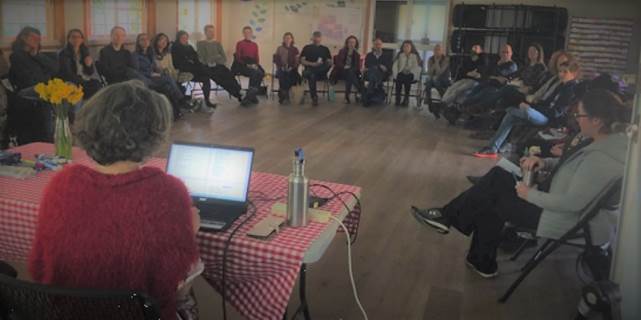
_______________________________________
Deep Ecology workshop with John Seed Dec 19
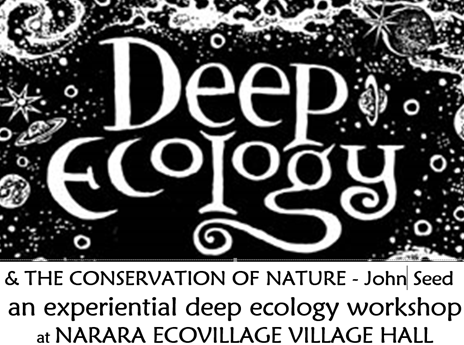
If the state government’s Covid rules allow vaccinated and unvaccinated to share space from about Dec 15 as anticipated, John Seed will be holding a day-long deep ecology workshop at the Narara Ecovillage Hall on Sunday Dec 19th.
To give priority to ecovillage and NELN members, the workshop will not be publicised elsewhere till next Friday 26/11.
50% discount for NEV members; 25% discount for NELN members
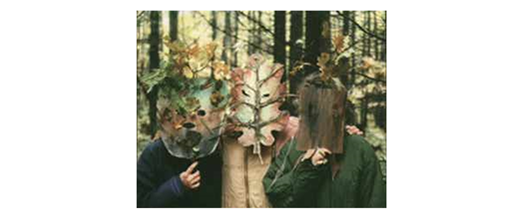
From our Network
Forest Therapy invitation
-Vicki Southgate
NEV friend Justina Mills is a guide in training for Forest Therapy, and has invited anyone interested to participate in one of a few free sessions she is holding over the coming months.
The first session is at Katandra Reserve, and will be a very gentle activity on a marked trail. Justina can also offer to organise a special group, min 4 people max of 10.
If you are interested, please leave your email or phone number on 0468 316 301 or jusmil2ls@gmail.com, and she can keep you informed, and invite you through Eventbrite.
Do a Thing A Day
Do something kind for frogs

Count them
• The Australian Museum says: There’s no way scientists can count Australia’s frogs on their own. The country’s too big and there’s too many frogs! That’s where you come in. With FrogID, citizen scientists just like you can help record frog calls and put more frogs on the map!
• Download the FrogID app here
Keep an eye out for unwell frogs
• How to recognise a sick frog, and what to do next
________________________________________
Do something kind for people
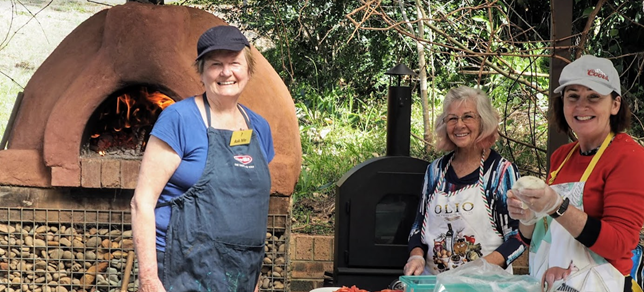
• An act of kindness can be large or small, and can be offered in person or remotely. You may never know the effect of your act of kindness, but that need not matter – there’s evidence that even small acts of kindness benefit the giver too, and can create positive feedback loops for all who are touched by it.
• It may feel like nothing much, but a smile, a cheery remark, a positive acknowledgement, an invitation or a helping hand can lighten everyone’s day.
Contact the Network News
Liz Bassett Editor network.news@neln.org.au

